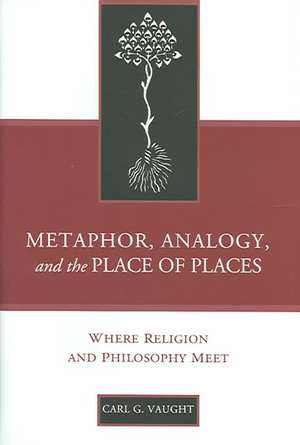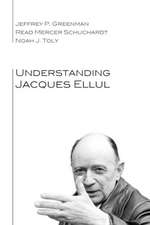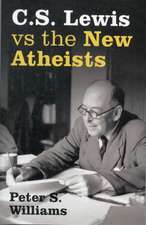Provost Series: Provost Series
Autor Carl G. Vaughten Limba Engleză Hardback – 8 noi 2004
Preț: 316.42 lei
Nou
Puncte Express: 475
Preț estimativ în valută:
60.54€ • 63.22$ • 49.100£
60.54€ • 63.22$ • 49.100£
Carte disponibilă
Livrare economică 25 martie-08 aprilie
Preluare comenzi: 021 569.72.76
Specificații
ISBN-13: 9781932792072
ISBN-10: 1932792074
Pagini: 180
Dimensiuni: 158 x 234 x 27 mm
Greutate: 0.5 kg
Ediția:New.
Editura: Baylor University Press
Seria Provost Series
ISBN-10: 1932792074
Pagini: 180
Dimensiuni: 158 x 234 x 27 mm
Greutate: 0.5 kg
Ediția:New.
Editura: Baylor University Press
Seria Provost Series
Recenzii
Only someone as well-versed in Anglo-American analytical philosophy's demand for rigor and clarity could tread so nimbly where such philosophers rarely venture, namely, in relating Being and God to time and space as well as relating Continental philosophers such as Hegel and Heidegger to ancient and medieval philosophers. Vaught offers a grand philosophical vision with deft attention to detail, promising medieval philosophy as the bridge that can span mystery and structure, metaphor and realism, Being and God. --Dan R. Stiver, Hardin-Simmons University and author of Theology After Ricoeur
Carl Vaught is one of the very few philosophers to have a deep, participative knowledge of religious life coupled with a command of both metaphysics and philosophy of language. For years he has been developing a metaphysics of analogy for understanding God as Being. At the same time he has elaborated an extraordinary interpretation of Augustine. Now he demonstrates a remarkable subtlety in distinguishing and connecting different types of religious and theological discourse. In this book he brings all these together to present a genuinely systematic philosophical theology. A splendid dividend is that he uses the systematic position and its language to reflect back on the history of Western philosophy, with remarkable insights. Metaphor, Analogy, and the Place of Places makes Vaught's position a major contender in contemporary philosophical theology and philosophy of religion. At the very least, after this book, no one can claim that philosophy and religion are not integral to each other. --Robert C. Neville, School of Theology, Boston University
Carl Vaught is one of the very few philosophers to have a deep, participative knowledge of religious life coupled with a command of both metaphysics and philosophy of language. For years he has been developing a metaphysics of analogy for understanding God as Being. At the same time he has elaborated an extraordinary interpretation of Augustine. Now he demonstrates a remarkable subtlety in distinguishing and connecting different types of religious and theological discourse. In this book he brings all these together to present a genuinely systematic philosophical theology. A splendid dividend is that he uses the systematic position and its language to reflect back on the history of Western philosophy, with remarkable insights. Metaphor, Analogy, and the Place of Places makes Vaught's position a major contender in contemporary philosophical theology and philosophy of religion. At the very least, after this book, no one can claim that philosophy and religion are not integral to each other. --Robert C. Neville, School of Theology, Boston University
Cuprins
Preface List of Abbreviations PART ONE: The Relation Between Religion and Philosophy 1. The Origins, the Context, and the Language of Religion and Philosophy 2. A New Conception of the History of Philosophy 3. Athens and Jerusalem PART TWO: Augustine, Hegel, Heidegger, and Jaspers 4. The Rhetoric of Augustine's Confessions 5. Immanence and Transcendence in Augustine's Confessions 6. Hegel and the Problem of Difference 7. Being and Existenz in Heidegger and Jaspers PART THREE: Mystery, Power, and Structure 8. The Quest for Wholeness 9. Being and God 10. Metaphor, Analogy, and the Nature of Truth Notes Index
Notă biografică
Dr Carl G Vaught was appointed Distinguished Professor of Philosophy at Baylor University in 1998. He received his B.A. from Baylor in 1961, where he graduated summa cum laude and received the Alpha Chi Scholarship Award as the valedictorian of his class. He attended Yale University as a Woodrow Wilson and a Danforth Graduate Fellow and received his Ph.D. in philosophy from Yale in 1966. Before he came to Baylor, he taught in the Philosophy Department at Penn State for thirty-one years where he directed the dissertations of twenty-nine graduate students and he served as Head of the Department of Philosophy from 1982 to 1992. He became a Fellow of the Society of Philosophy in America in 1987, was affiliated with Oriel College in Oxford in 1990-91, and was a Distinguished Alumnus at Baylor in 1993. His principal philosophical interests are metaphysics, the philosophy of religion, and the history of philosophy.














